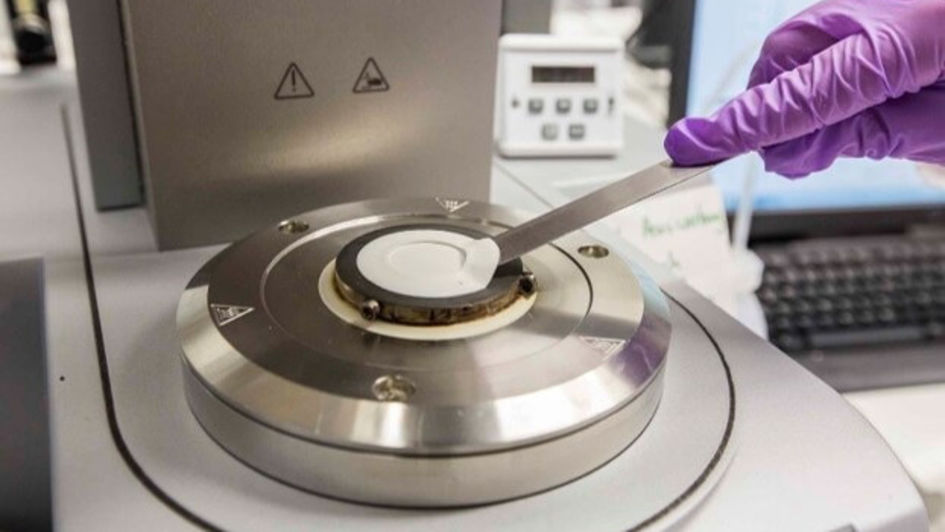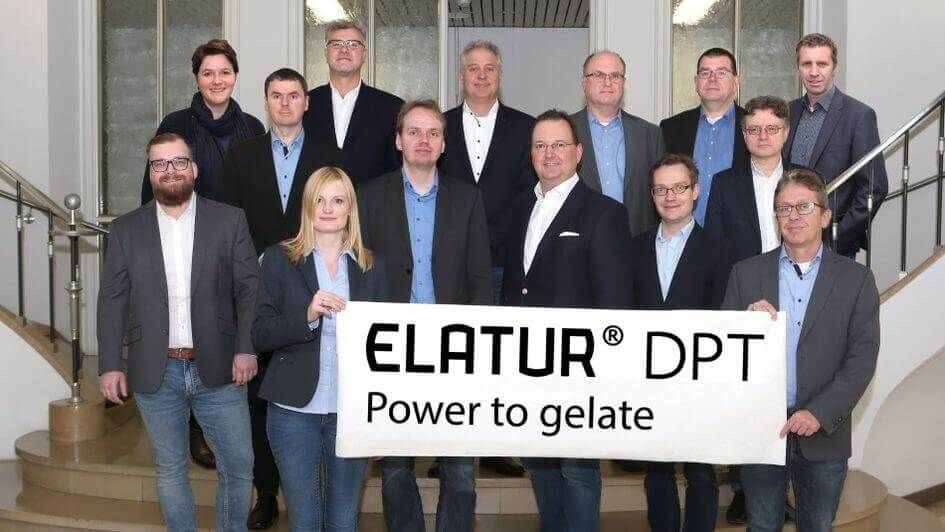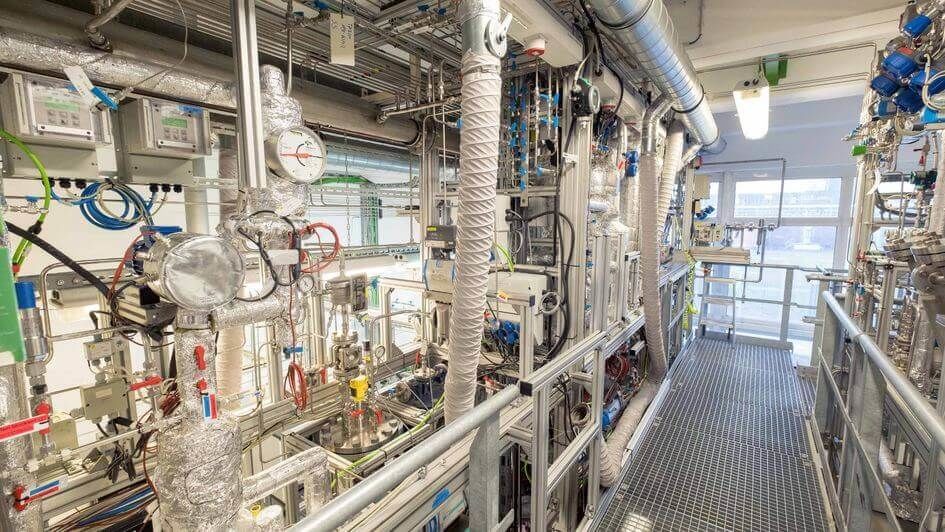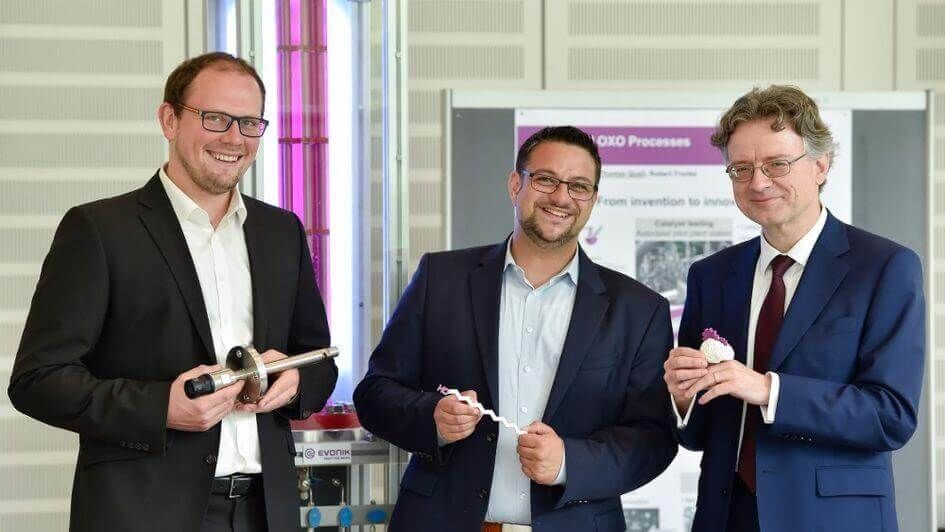
C4-Innovation: pioneering process & product development
C4-Innovation means sustainability: we optimize processes, develop new products and support our customers with our technical expertise.
Benefit from our STRONG TECHNOLOGY POSITION
Our networked production enables us to obtain almost 100-per cent value generation from our raw materials.
In order to increase the value, the efficiency and the sustainability of the C4 process chain even further, we continue to develop our procedures. As the industry leader in this area, we employ approx. 70 experts for hydroformylation, oligomerization and esterification.
We generate approx. two thirds of our current product sales on the basis of our in-house developments. This also includes diversification of our plasticizer portfolio. We protect this know-how with more than 240 active patents and patent applications.
WE OPERATE HIGHLY MODERN APPLICATION LABORATORIES

In our state-of-the-art application laboratory, our experts develop new plasticizers and work on improved formulations. With our technological know-how and our modern analysis and testing procedures, we accompany and support numerous customer projects.
“AND THE WINNER IS…”

...in this case, the idea is not directly from Performance Materials, but our Performance Intermediates Business Line has now been nominated for the Evonik Innovation Award for the third year in a row. And this latest nomination shows: We are at the forefront of innovation!
Evonik Innovation Award 2018 Nomination ELATUR DPT (pdf, 413 KB)
WE LIVE UP TO OPEN INNOVATION - ROMEO A NEW REACTOR CONCEPT TO DRASTICALLY REDUCE ENERGY CONSUMPTION & EMISSIONS
ROMEO stands for "Reactor Optimization by Membrane Enhanced Operation" and is a new reactor concept designed to drastically reduce energy consumption.
In cooperation with partners from science and industry, we are involved in the "ROMEO" project to develop a new reactor concept that can cut energy consumption by up to 80 percent and emissions by up to 90 percent. The EU Commission is funding the project with six million euros as part of the Horizon 2020 research program, and our employee Prof. Robert Franke is acting as global coordinator for the project.
Public research funding is an important element of exploratory technology development at our company. "Intensive collaboration with partners from science and industry is an important pillar on our way to making our chemical business smart," Franke said. "Through ROMEO, we can further expand our network and measure our competitiveness," Franke said.
Visit the project's official website for detailed information: ROMEO - Reactor Optimization by Membrane Enhanced Operation.
Now things are getting big - innovative membrane reactor on its way to being an industrial scale

Evonik is continuing to strengthen its position as one of the leading companies in the field of C4 chemistry. MACBETH (Membranes And Catalysts Beyond Economic and Technological Hurdles), the largest EU-funded project coordinated by Evonik to date, was recently launched The aim is to develop a new process for catalytic synthesis with appropriate separation equipment in a single, highly efficient catalytic membrane reactor (CMR). MACBETH is the follow-up project to the ROMEO project (Reactor Optimization by Membrane Enhanced Operation), which was completed in September 2019.
The newly founded project consortium consists of 24 partners from ten different countries. It brings together expertise related to catalysis to membranes, carriers, reactors, engineering, modelling as well as the perspective of the end user.
"It is crucial that we think beyond the boundaries of chemistry, share knowledge and exploit synergies. One individual company could never achieve this. Our consortium brings together the know-how that is essential for the desired breakthrough in catalytic synthesis," says Dr. Marc Oliver Kristen, Head of the Innovation Agency at Evonik and Project Manager MACBETH.
In individual sub-projects, the concept of the new reactor is now being applied to various chemical reactions and put into practice. This includes hydroformylation for specialty chemicals, hydrogen production for the transport/electricity generation sector, propane dehydrogenation (PDH) for large-volume chemicals and biocatalytic oil cleavage for biotechnologically manufactured products.
Evonik’s focus of the project is on the hydroformylation reaction. In this catalysis, which is traditionally carried out homogeneously, synthesis gas is used to convert olefins into aldehydes.
Sustainability is a key driver here: the planned reduction of greenhouse gas emissions in large-volume industrial processes will be up to 35% and the increase in resource and energy efficiency up to 70%.
Furthermore, the new reactor design not only guarantees considerably smaller and even safer production plants. It also helps to strengthen the leading role in the market, because in future, the investment costs (CAPEX) and operating costs (OPEX) of systems of this type can be reduced by up to 50% and 80% respectively.
"Our next milestone is clear: We want to implement and operate a demonstration plant under real, industrial conditions," says Prof. Dr. Robert Franke, Project Coordinator of the overall MACBETH project and Head of Hydroformylation Research at Evonik. "Therefore, we will now, in the first project phase of MACBETH, concentrate on the optimization of the components used and the final reactor system. For this purpose, we will utilise the promising developments and results from the previous project."
Learn everything about the MACBETH project in a nutshell or visit the official MACBETH project website.
Breaking new ground in the field of innovation

In the field of innovation, we are breaking new ground by relying on targeted monitoring of processes using spectroscopic inline analysis technologies.
Dr. Alexander Braecher, Dr. Thomas Quell and Prof. Dr. Robert Franke optimize oxo processes within the C4-Verbund. For this purpose, existing data is collected and usefully supplemented by the collection of new data, including the use of spectroscopic inline analysis technologies. These data form the basis for targeted monitoring of the processes supported by their process engineering colleagues (VT-C PAT).
The specific optimizations are very comprehensive: a combination of detailed monitoring and continuous optimization of analytical methods enables the collection of relevant data in more regular intervals.
Therefore, two technologies are basically necessary: On the one hand the implementation of fully automated inline sensors, on the other hand the application of the Data Analytics Software Suite KNIME, which has been used for various purposes within PI's research for several years.
